Henry Cloud's Blog, page 24
March 26, 2015
Boundaries, Self-Control, and the Desire for Revenge
Matthew 5:38 – 42: “You have heard that it was said, ‘Eye for eye, and tooth for tooth.’ But I tell you, do not resist an evil person. If anyone slaps you on the right cheek, turn to them the other cheek also. And if anyone wants to sue you and take your shirt, hand over your coat as well. If anyone forces you to go one mile, go with them two miles. Give to the one who asks you, and do not turn away from the one who wants to borrow from you.”
Many of us have known people who, after years of being passive and compliant, suddenly stop acting like a victim. This reactive phase of boundary creation is a first step to get a person out of the powerless, victimized place in which they may have been forced by physical or sexual abuse, or by emotional blackmail or manipulation. We are happy that they are no longer victims. But when is enough reacting enough?
Reaction phases are not the same as maturity; they are necessary but not sufficient for the establishment of boundaries. Even though in finding our boundaries, we might find ourselves reacting. Eventually, we establish connections as respectful equals. This is the beginning of establishing proactive, instead of reactive, boundaries.
In Matthew 5:38–39, Jesus compared reactive persons to those who are freely and proactively setting their own boundaries. Through his teaching, we see that power is not something we demand or deserve; it is something we express. How does withholding a counterstrike after we’ve been harmed show our power? The ultimate expression of power is love. Proactive people are able to love their neighbors as themselves (see Mark 12:31) and respect others (see 1 Peter 2:17). They are able to die to self (see 1 Peter 2:24) and not repay evil for evil (see Romans 12:17). They have gotten past the reactive stance of the law — “eye for eye, and tooth for tooth” — and are able to love rather than react.
When we truly have the power of self-control, another person’s evil does not mean that we “have to” get revenge. We are free to do something more redemptive and more constructive. In that way, we have power to turn bad situations into good ones and not be dragged down into the mire of bad behavior.
 Find more insightful commentary from Drs. Henry Cloud and John Townsend, read the NIV Life Journey Bible, which combines the world’s most accessible Bible translation with exclusive teaching.
Find more insightful commentary from Drs. Henry Cloud and John Townsend, read the NIV Life Journey Bible, which combines the world’s most accessible Bible translation with exclusive teaching.
The post Boundaries, Self-Control, and the Desire for Revenge appeared first on Boundaries Books.
Raising Kids With an Eye on the Future
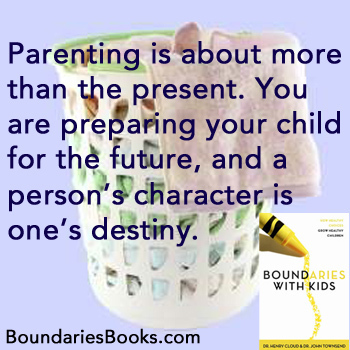 It was a normal day, but one that would forever change my friend’s parenting. We had finished dinner, and I (Dr. Cloud) was visiting with my friend, Allison, and her husband, Bruce, when she left the dinner table to do some chores. Bruce and I continued to talk until a phone call took him away as well, so I went to see if I could lend Allison a hand.
It was a normal day, but one that would forever change my friend’s parenting. We had finished dinner, and I (Dr. Cloud) was visiting with my friend, Allison, and her husband, Bruce, when she left the dinner table to do some chores. Bruce and I continued to talk until a phone call took him away as well, so I went to see if I could lend Allison a hand.
I could hear her in their 14-year-old son Cameron’s room. I walked in to a scene that jolted me. She was cheerfully putting away clothes and sports equipment and making the bed. She struck up a conversation as if things were normal: “I can’t wait for you to see the pictures from our trip. It was so much—” “What are you doing?” I asked. “I’m cleaning up Cameron’s room,” she said. “What does it look like I’m doing?” “You are what?” “I told you. I’m cleaning up his room. Why are you looking at me like that?” All I could do was to share with her the vision in my head. “I just feel sorry for Cameron’s future wife.”
Allison straightened up, froze for a moment, and then hurried from the room. I walked into the hall to see her standing there motionless. Not knowing what to say, I said nothing. After a few moments, she looked at me and said, “I’ve never thought about it that way.”
Nor have most of us. We parent in the present without thinking about the future. We usually deal with the problems at hand. But one goal of parenting is to keep an eye on the future. We are raising our children to be responsible adults. Parents interact with their children in a way that comes naturally to them.
For example, Allison was by nature a “helper,” and she gladly helped her son. Others have different parenting styles. Some, who are more laid back and uninvolved, leave their son’s room alone. Those who are stricter inflict heavy punishment for a less than regulation-made bed.
 Certainly, child rearing requires many different interventions. There are times for helping, for not getting involved, or for being strict. But the real issue is this: Is what you are doing being done on purpose? Or are you doing it from reasons that you do not think about, such as your own personality, childhood, need of the moment, or fears? Remember, parenting has to do with more than the present. You are preparing your child for the future, and a person’s character is one’s destiny.
Certainly, child rearing requires many different interventions. There are times for helping, for not getting involved, or for being strict. But the real issue is this: Is what you are doing being done on purpose? Or are you doing it from reasons that you do not think about, such as your own personality, childhood, need of the moment, or fears? Remember, parenting has to do with more than the present. You are preparing your child for the future, and a person’s character is one’s destiny.
Question for Reflection:
In what ways could you parent your son or daughter with a stronger focus on their future? What changes could you make this week to move in that direction?
 Learn more about how to instill the kind of character in your children that will help them lead balanced, productive, and fulfilling lives in Boundaries with Kids.
Learn more about how to instill the kind of character in your children that will help them lead balanced, productive, and fulfilling lives in Boundaries with Kids.
Image courtesy of Keerati / FreeDigitalPhotos.net
The post Raising Kids With an Eye on the Future appeared first on Boundaries Books.
March 19, 2015
The Purpose of Confronting Controllers
Consider the following situation in the Bible where Peter, one of Jesus’ disciples, acts in a controlling manner:
Mark 8: 31-33 – “Jesus then began to teach them that the Son of Man must suffer many things and be rejected by the elders, the chief priests and the teachers of the law, and that he must be killed and after three days rise again. He spoke plainly about this, and Peter took him aside and began to rebuke him. But when Jesus turned and looked at his disciples, he rebuked Peter. “Get behind me, Satan!” he said. “You do not have in mind the concerns of God, but merely human concerns.”
One of the most important benefits of having boundaries is that we have the ability to stand up to others when they try to control our lives. Peter wanted to impose his own design for Jesus’ life onto Jesus, but Jesus had good boundaries; he stood up to Peter and rebuked him.
Jesus showed that he was in control of himself and would not be defined and controlled by Peter, no matter how good Peter’s intentions might have been. The truth is that Peter was thinking, not of God’s purposes, but of his own agenda. Peter was trying to rescue Jesus instead of turning the situation over to God.
We must be on guard against anyone or anything that might take control of us. Self-control is the fruit of the Spirit (see Galatians 5:22 – 23). When we have self-control, we maintain the ability to stand up to aggressive controllers who try to tell us who we should be and what we should do. Although we are wise to listen to others and be open to their feedback, we should never allow someone to be in control of us and define who we are. Setting appropriate boundaries helps us to retain that kind of freedom and self-control.
 If you love the “Boundaries” books, check out the NIV Life Journey Bible, which combines the world’s most accessible Bible translation with exclusive teachings from Drs. Henry Cloud and John Townsend.
If you love the “Boundaries” books, check out the NIV Life Journey Bible, which combines the world’s most accessible Bible translation with exclusive teachings from Drs. Henry Cloud and John Townsend.
The post The Purpose of Confronting Controllers appeared first on Boundaries Books.
March 16, 2015
When Good Christians Are Bad At Relationships
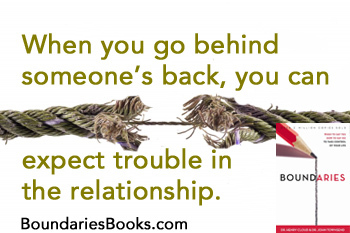 I (Dr. Cloud) can still remember what happened that day when I was eight years old. I made a big mistake, but I didn’t know it at the moment. I thought I was getting back at my sister, who was sixteen at the time. Opportunities for revenge were few and far between, and I was not about to let this one slip by. Sharon and her friend were goofing around in the den when one of them threw a pillow and broke the overhead light. They quickly figured out a way to arrange the light in such a way that you could not tell it was broken. They thought that they were off the hook. Little did my sister know that she had a sociopathic little brother with a plan.
I (Dr. Cloud) can still remember what happened that day when I was eight years old. I made a big mistake, but I didn’t know it at the moment. I thought I was getting back at my sister, who was sixteen at the time. Opportunities for revenge were few and far between, and I was not about to let this one slip by. Sharon and her friend were goofing around in the den when one of them threw a pillow and broke the overhead light. They quickly figured out a way to arrange the light in such a way that you could not tell it was broken. They thought that they were off the hook. Little did my sister know that she had a sociopathic little brother with a plan.
When my father came home, I could not wait to tell him what they had done. I told him that they had broken the light, and he asked me to show him. I led him into the den, not knowing that Sharon and her friend were still in there. I was caught. Here he was, asking me about the broken light, and there they were, watching me seal my fate as a tattletale. I do not remember what he did to them, but I can still recall what they did to me, and it was not pretty.
It would be years before I understood the principle involved in this incident. But on that day I understood the reality: When you go behind someone’s back, you can expect trouble in the relationship.
One of the most important principles in relationship is direct communication and full disclosure of whatever is going on in the relationship. I had never communicated to my sister what I thought about what she did, given her a chance to turn herself in, or even cared enough to find out if she planned to tell Dad in her own time. My actions had two overriding motivations: I wanted my sister to pay, and I was afraid to be direct with her. I was foolish enough to think that I could pull it off without her knowledge and that I wouldn’t have to deal with her anger.
Since I have become a psychologist, I have learned a lot about the destructiveness of indirect communication. This is how it happens. I have a problem with Person A, and I tell Person B. Now I have three problems: The first one that I told Person B about, the second one of Person B having feelings about person a that a doesn’t know about, and the eventual problem of Person A finding out that I told B and feeling betrayed by me.
The cousin of that dynamic occurs when Person A tells me something about Person B and then I tell Person B. B is angry with A, and A does not know why. Later, A is mad at me for telling B, or in denial that he ever said anything to me in the first place.
The Bible says much about this kind of indirect communication of truth and also about the restorative value of direct communication. Here is a sample of how God feels about our not being honest in communication:
He who conceals his hatred has lying lips, and whoever spreads slander is a fool (Proverbs 10:18).
Rebuke your neighbor frankly so you will not share in his guilt (Leviticus 19:17).
When I say to a wicked man, “You will surely die,” and you do not warn him or speak out to dissuade him from his evil ways in order to save his life, that wicked man will die for his sin, and I will hold you accountable for his blood (Ezekiel 3:18).
Therefore each of you must put off falsehood and speak truthfully to his neighbor, for we are all members of one body…Do not give the devil a foothold (Ephesians 4:25, 27).
Being indirect in our communication can show us to be foolish, make us a part of the problem, make us accountable for the existence of the problem, and cause us to get caught up in the Devil’s snare as we bury anger and strife.
Along with being against indirect communication, God also has much to say about the importance of direct communication in relationships and resolving things with another person:
If your brother sins against you, go and show him his fault, just between the two of you. If he listens to you, you have won your brother over (Matthew 18:15).
Therefore, if you are offering your gift at the altar and there remember that your brother has something against you, leave your gift there in front of the altar. First go and be reconciled to your brother; then come and offer your gift (Matthew 5:23–24).
Better is open rebuke than hidden love (Proverbs 27:5).
Direct communication is the best way to go through life. But many people do not deal with others in that fashion. Instead, they practice avoidance (ignoring the person or the problem) or triangulation (bringing in a third person) or overlooking.
 In “Boundaries,” The Law of Exposure says that life is better lived in the light— that is, things are better out in the open, even if these things are negative. Whether the news is bad or not, we need to know it. Conflict or hard feelings cause a break in the connection between two people, and relationship can only be restored by communicating honestly.
In “Boundaries,” The Law of Exposure says that life is better lived in the light— that is, things are better out in the open, even if these things are negative. Whether the news is bad or not, we need to know it. Conflict or hard feelings cause a break in the connection between two people, and relationship can only be restored by communicating honestly.
Fraying rope image courtesy of ScottChan at FreeDigitalPhotos.net
The post When Good Christians Are Bad At Relationships appeared first on Boundaries Books.
March 9, 2015
Boundaries and Emotional Blackmail
 “Every time I disagree with my mother, even on little things, I feel this terrible sense that she’s not there anymore,” mused Ingrid over coffee with her friend Alice. “It’s like she’s hurt and withdrawn, and I can’t get her back. It’s really a horrible feeling to think you’ve lost someone you love.”
“Every time I disagree with my mother, even on little things, I feel this terrible sense that she’s not there anymore,” mused Ingrid over coffee with her friend Alice. “It’s like she’s hurt and withdrawn, and I can’t get her back. It’s really a horrible feeling to think you’ve lost someone you love.”
Let’s be honest. None of us enjoys being told no. It’s difficult to accept another person’s refusal to give support, to be intimate, or to forgive. Yet good relationships are built on the freedom to refuse and confront. Proverbs 27:17 says, “As iron sharpens iron, so one man sharpens another.”
Good relationships are built on appropriate no’s. Even when we’re children, young or old, we need to know our boundaries will be honored. It is crucial that our disagreements, our practicing of saying no, and our experimentation will not result in a withdrawal of love.
How often do we hear the statement that “God loves the sinner, but hates the sin”? It’s true. His love is constant and never fails. When parents detach from a misbehaving young child instead of staying connected and dealing with the problem, God’s constant love is misrepresented.
When parents pull away in hurt, disappointment, or passive rage, they are sending this message to their youngster: You’re loveable when you behave. You aren’t loveable when you don’t behave. A child translates that message something like this: When I’m good, I am loved. When I’m bad, I am cut off.
God created people with a need for attachment and relationship. In essence, parents who pull away from their child, whether young or old, practice spiritual and emotional blackmail. The child can either pretend to not disagree and keep the relationship, or he can continue to separate and lose his most important relationship in the world. Thus, he will most likely keep quiet.
Children whose parents withdraw when they start setting limits learn to accentuate and develop their compliant, loving, sensitive parts. At the same time, they learn to fear, distrust, and hate their aggressive, truth-telling, and separate parts. If someone they love pulls away when they become angry, cantankerous, or experimental, children learn to hide these parts of themselves.
Parents who tell their children, “It hurts us when you’re angry” make the child responsible for the emotional health of the parent. In effect, the child has just been made the parent of the parent— sometimes at two or three years old. It’s far, far better to say, “I know you’re angry, but you still can’t have that toy.” And then to take your hurt feelings to a spouse, friend, or the Lord.
 By nature, children are omnipotent. They live in a world where the sun shines because they were good, and it rains because they were naughty. Children will give up this omnipotence gradually over time, as they learn that needs and events besides theirs are important. But during the early years, this omnipotence plays right into boundary injury. When children feel parents withdrawing, they readily believe that they are responsible for Mom and Dad’s feelings. That’s what omnipotent means: “I am powerful enough to make Mom and Dad pull away. I’d better watch it.”
By nature, children are omnipotent. They live in a world where the sun shines because they were good, and it rains because they were naughty. Children will give up this omnipotence gradually over time, as they learn that needs and events besides theirs are important. But during the early years, this omnipotence plays right into boundary injury. When children feel parents withdrawing, they readily believe that they are responsible for Mom and Dad’s feelings. That’s what omnipotent means: “I am powerful enough to make Mom and Dad pull away. I’d better watch it.”
A parent’s emotional withdrawal can be subtle: A hurt tone of voice. Long silences for no reason. Or it can be overt: Crying spells. Illness. Yelling. Children of parents like these grow up to be adults who are terrified that setting boundaries will cause severe isolation and abandonment.
Please don’t misunderstand this. Parents setting boundaries with their children is crucial. Children need to know behavioral lines that should not be crossed. They need to suffer biblical, age-appropriate consequences for acting out. (In fact, when parents do not set and maintain good boundaries with their children, the children suffer another type of boundary injury.
What we’re talking about here isn’t allowing the child free rein. Parents need to stay attached and connected to their children even when they disagree with them. That doesn’t mean they shouldn’t get angry. It means they shouldn’t withdraw.
 With over 2 million copies sold, Boundaries is the best resource for learning how to set limits and make wise decisions in any relationship.
With over 2 million copies sold, Boundaries is the best resource for learning how to set limits and make wise decisions in any relationship.
Click here to purchase your copy today
Winter trees image courtesy of dan at FreeDigitalPhotos.net
The post Boundaries and Emotional Blackmail appeared first on Boundaries Books.
March 5, 2015
Boundaries Q&A with Dr. Townsend: How to Love Without Enabling an Adult Child
 Question: Dr. Townsend, I have a 35-year-old son in jail for possession of a controlled substance and thievery. How do I love him without enabling him, yet letting him know that I care?
Question: Dr. Townsend, I have a 35-year-old son in jail for possession of a controlled substance and thievery. How do I love him without enabling him, yet letting him know that I care?
First, let me say that I am sorry for you and your son’s situation. I’m also very glad you want to help him. Jail is a lonely and difficult place to be, even if the individual has committed acts that justify him being there.
To answer to your question, in a way, you really don’t have to worry a great deal about enabling him. To “enable” is to remove someone from the consequences of his behavior, and jail actually is those consequences. So, he is already in a non-enabling environment. I have worked with inmates, and the responses have been very growth-producing for them. Here are three things you can do to help your son while maintaining healthy boundaries:
1. Stay connected to him. Often, loved ones will visit an inmate in prison or jail at first, then they will come less frequently, because either they don’t like the negative environment, or they simply disconnect and move on. Don’t do that. If there is any time a person needs someone who is “for” him and is committed in behaviors (visits, phone calls and letters), it is at this point. You are literally one of the lifelines your son needs. Keep coming back!!!
2. Encourage him to be active in life-giving endeavors. As soon as possible, he needs to get involved in healthy activities and relationships, to help counter the isolation and toxic people. Encourage him to get in a Bible study or a 12-step group, get with Prison Fellowship, take a GED course, or learn a trade. He needs as much health as he can get.
3. Accept and listen to him without supporting his blaming. There is one thing you might be tempted to enable him in, and that is if he talks about how unfair it all is and how nothing was his fault. That “stinkin’ thinking” is likely to land him back in jail. If he does this, either don’t respond and change the subject, or confront it vulnerably and tell him you’re concerned about that attitude. That can often help his brain to readjust to the right priorities.
The Bible is full of stories of people who spent time in jail, including Joseph, Daniel, Peter and Paul. Be “Jesus with skin on” for your son. Send him good books on growth and healing. Jail means “I have time” to think, read and grow.
Some people I know who have been incarcerated have said that the following books helped them a great deal in their journey: Phillip Yancey’s “What’s So Amazing About Grace,” Joyce Meyers’ “Battlefield of the Mind,” Patrick Morley’s “Man in the Mirror,” John Baker’s “Life’s Healing Choices,” and my books with Dr. Henry Cloud, “Where is God?” and “How People Grow.”
God bless you, and if you still find it difficult to have a boundary-setting conversation with your adult child, consider reading these resources:
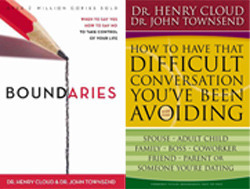 Boundaries
Boundaries
Chapter 10 – “Boundaries and Your Children”
How to Have That Difficult Conversation You’ve Been Avoiding
Chapter 25 – “With Adult Children”
Click on the book title links above for details and purchasing
Got a question for Dr. Townsend? Send them to us via email at: BoundariesBooksTeam@gmail.com
Due to Dr. Townsend’s busy schedule, not all questions will be able to be addressed and answered.
The post Boundaries Q&A with Dr. Townsend: How to Love Without Enabling an Adult Child appeared first on Boundaries Books.
March 1, 2015
Tips to Set Boundaries at Work
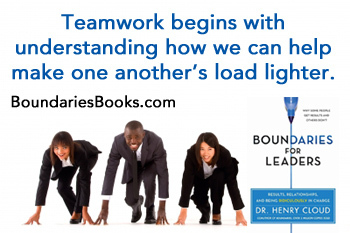 If you are like most people, you spend a lot of your life at work. Work is a place with many possibilities for stress, conflict, risk, and loss. It is a place where you put in the best of who you are. You are serving, and at times sacrificing, trying to please, and also establishing friendships on the teams with whom you work. So it naturally follows that you can experience some emotionally trying times there.
If you are like most people, you spend a lot of your life at work. Work is a place with many possibilities for stress, conflict, risk, and loss. It is a place where you put in the best of who you are. You are serving, and at times sacrificing, trying to please, and also establishing friendships on the teams with whom you work. So it naturally follows that you can experience some emotionally trying times there.
In addition, you have a job to do. Sometimes, in the course of doing your job, you have to establish boundaries with other people who are not doing their jobs well. They may be your colleagues or people you manage and supervise or your supervisors and bosses. Much rides on your ability to communicate well. It may make a difference not only in how you feel on the job, but also whether your company or department performs well.
When you look at leadership research, management theory, and all the things that have ever been studied about how good work environments operate, two areas always emerge: task and relationship. Work has to do with getting a job done (the task) and getting along well with the people who are doing the task (the relationship). We work hard at tasks, and we do that with other people. It’s important that the two work together.
Both of these areas depend on establishing good communication and confrontation skills. To get a job done, we have to solve problems and “face” things. To get along well, we have to work out relational issues with each other through facing things as well. So the entire arena of work requires good confrontation skills to work well. Confront well, and you will work better also. The best teams, and the best work cultures are those that confront well.
People are afraid to confront those over them as well as those under them. Often there are accountability structures established at work, and policies in place streamline interactions along the chain of command. The problem is more often that people don’t confront rather than that they can’t. That is why I regard a lack of confrontation as more of a personal issue than a “work” or “authority” issue. What can you do? Here are some helpful tips for confronting people at work:
Click here for tips to set boundaries at work
The post Tips to Set Boundaries at Work appeared first on Boundaries Books.
February 22, 2015
Let Go of Guilt-Centered Parenting
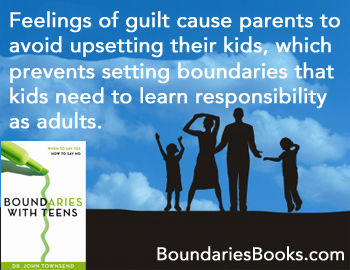 I wasn’t there for him, so I avoided setting limits with him.” Ray was talking to me about his son Brad, who had begun drinking and running with a bad crowd. However, in assuming he would solve one problem, he actually created a second problem, and now his son was worse off.
I wasn’t there for him, so I avoided setting limits with him.” Ray was talking to me about his son Brad, who had begun drinking and running with a bad crowd. However, in assuming he would solve one problem, he actually created a second problem, and now his son was worse off.
Fortunately, Ray saw the flaw in his thinking. A self-diagnosed workaholic, Ray had, from his own report, been too wrapped up in his career to connect adequately with his son. However, now that Brad’s problems were serious, Ray had reprioritized his life and was making up for lost time.
I asked him, “Why did you think that not setting limits would help?”
“I know, it doesn’t make sense. I think I felt guilty for not being there enough when Brad needed me. So I thought the time I did spend with him should be positive.”
Guilt fueled Ray’s flawed thinking, as it does for many parents. Both guilt and fear are internal emotional states that often prevent parents from setting the right boundaries that can help a teen learn responsibility. So it’s important for you to understand how these emotions can affect your own parenting and what you can do to resolve them.
Guilt is a feeling of self-condemnation over doing something that hurts your child. When parents are too harsh, let their kid down, or are absent in some way, they will often be harsh and critical with themselves. This feeling of self-judgment can be very strong and intense.
 However, guilt is not a helpful emotion. Some parents mistakenly view guilt as a sign that they care about their teen. But guilt is more about the parent, because guilt centers on the parent’s failures and badness rather than on the teen’s difficulty and hurt. Guilt does nothing to help the teen’s situation. Instead, guilt creates an obsessive pattern of thinking that cycles around, making you beat yourself up. Guilt keeps you from doing something that will make your teen mad, disappointed, or frustrated, because you want to avoid even greater and more intense guilt feelings.
However, guilt is not a helpful emotion. Some parents mistakenly view guilt as a sign that they care about their teen. But guilt is more about the parent, because guilt centers on the parent’s failures and badness rather than on the teen’s difficulty and hurt. Guilt does nothing to help the teen’s situation. Instead, guilt creates an obsessive pattern of thinking that cycles around, making you beat yourself up. Guilt keeps you from doing something that will make your teen mad, disappointed, or frustrated, because you want to avoid even greater and more intense guilt feelings.
If you struggle with guilt and want resolution, learn to experience remorse instead. Remorse, the healthy alternative to guilt, centers on the other person. Remorse is an empathic concern for the pain that your teen feels. It is also solution oriented. If you feel remorse over something you have done that has hurt your teen, your focus is on helping your teen heal from the damage you have done. The apostle Paul explained remorse in terms of the difference between worldly sorrow and godly sorrow in 2 Corinthians 7:9-10:
“Yet now I am happy, not because you were made sorry, but because your sorrow led you to repentance. For you became sorrowful as God intended and so were not harmed in any way by us. Godly sorrow brings repentance that leads to salvation and leaves no regret, but worldly sorrow brings death.”
When you feel remorse toward your teen, you free yourself to be sad about what you have done and to repair the effects. When guilt doesn’t weigh you down, you are free to set and keep limits with your teen, so that your child can benefit from experiencing structure, clarity, and consequences.
So face your guilt feelings. Tell yourself: I will sometimes let my teen down. I will not always be what my child needs me to be. Understand that this is inevitable, but don’t stop there. When you do something that hurts your teen, put your focus on how this affects her, and allow yourself to feel remorse instead so that you can give her the structure and boundaries she needs. You will help your own life as well as your teen’s.
 Discover how your teenager thinks. Learn how to apply biblical principles to specific problems. Boundaries with Teens can help you establish wise and loving limits that make a positive difference in your adolescent, in the rest of your family, and in you.
Discover how your teenager thinks. Learn how to apply biblical principles to specific problems. Boundaries with Teens can help you establish wise and loving limits that make a positive difference in your adolescent, in the rest of your family, and in you.
The post Let Go of Guilt-Centered Parenting appeared first on Boundaries Books.
February 19, 2015
Boundaries Q&A with Dr. Townsend: 4 Tips to Deal with a Narcissist
 Question: Dr. Townsend, can you give advice for someone who thinks they are married to a narcissist? Everything seems to revolve around my spouse’s wishes and demands.
Question: Dr. Townsend, can you give advice for someone who thinks they are married to a narcissist? Everything seems to revolve around my spouse’s wishes and demands.
I’m sorry to hear about your situation. First off, the label of “narcissism” is not very helpful unless you are talking with a licensed therapist who has actually done an interview and diagnosed the person. People throw around the term, “narcissism,” a lot and it gets confusing. It’s much more helpful to talk about specific attitudes and behaviors that are problematic. For example, your second sentence, about everything seeming to revolve around your spouse’s wishes and demands, is clear and specific. So let’s deal with that aspect and get you some relief. Here are four tips:
1. Be clear about the problem, and be vulnerable about its impact on you. Many times a spouse who is self-involved will not be able to pick up hints, nuances, and indirect remarks about their attitudes. You need to be direct, though vulnerable, with them about the problem. For example, you could say, “I love you and care about our marriage. But this past week, when I tried to talk to you about our financial problems, you kept turning it back to you and your needs. You really didn’t ask how I felt or asked about my point of view. I want to help with your needs, but I start feeling helpless and a bit alone, when it’s not a two-way street between us.”
2. Own your part. 99% of the time there is some “beam in our eye,” or contribution to the problem (see Matthew 7:3-5). When you admit this to your spouse, you are helping by getting out of the “I’ve got it together and you are a screwup” mode and into the “We both have challenges” mode, which makes what you have to say much more digestible. You might say, “I am part of the problem here. I often get quiet and sarcastic with you, which isn’t kind. Or I overreact and blow up, which doesn’t help either. I’m going to try to do better about this.”
3. Ask for specific change. You can’t get a change when you don’t ask for one, as we don’t have because we don’t ask (see James 4:2). Don’t assume your spouse knows how to change, so help him or her. Say, “When I talk to you about money, please give me eye contact, be nice, say words that show you understand, and then after that, give me your point of view.” A spouse that has difficulty getting out of his or her emotional frame of reference can read my book, Loving People, which provides ways to listen and show you are listening, as good skills.
4. Move to consequences when all else fails. Unfortunately, some people are not moved by vulnerability and reason. They tend to deny reality until it moves out of the “words” world into the “action” world. In this case, read Boundaries in Marriage and create consequences that do not condemn nor control your spouse. Basically say, “I am giving up trying to reason with you, so I am going to take some steps that will get me out of the hurtfulness of your behavior.” This might mean being less emotionally vulnerable and available, or going to a Dave Ramsey financial course, or seeing a counselor for marriage work on your own.
It helps to realize that God has been healing self-involved people for a long time. Work His processes. God bless you, and if you still find it difficult to have a boundary-setting conversation with your spouse, consider reading these resources:
 Boundaries
Boundaries
Chapter 9 – “Boundaries and Your Spouse”
How to Have That Difficult Conversation You’ve Been Avoiding
Chapter 21 – “With a Spouse”
Click on the book title links above for details and purchasing
Got a question for Dr. Townsend? Send them to us via email at: BoundariesBooksTeam@gmail.com
Due to Dr. Townsend’s busy schedule, not all questions will be able to be addressed and answered.
The post Boundaries Q&A with Dr. Townsend: 4 Tips to Deal with a Narcissist appeared first on Boundaries Books.
February 15, 2015
You Are Not Responsible For Your Mate
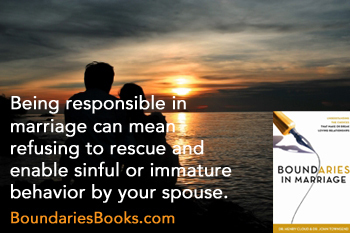 When you marry someone, you take on the burden of loving your spouse deeply and caring for him or her as for no other. You care about how you affect your spouse; you care about your spouse’s welfare and feelings. If one spouse feels no sense of responsibility to the other, this spouse is, in effect, trying to live married life as a single person. On the other hand, you can’t cross the line of responsibility. You need to avoid taking ownership for your mate’s life.
When you marry someone, you take on the burden of loving your spouse deeply and caring for him or her as for no other. You care about how you affect your spouse; you care about your spouse’s welfare and feelings. If one spouse feels no sense of responsibility to the other, this spouse is, in effect, trying to live married life as a single person. On the other hand, you can’t cross the line of responsibility. You need to avoid taking ownership for your mate’s life.
The law of responsibility in marriage is this: We are responsible to each other, but not for each other. The Bible teaches it this way: “Carry each other’s burdens, and in this way you will fulfill the law of Christ” and “each one should carry his own load” (see Galatians 6:2, 5). The word burden indicates a backbreaking boulder, such as a financial, health, or emotional crisis.
Spouses actively support each other when one is carrying an overwhelming burden. The term load, however, indicates one’s daily responsibilities of life. This includes one’s feelings, attitudes, values, and handling of life’s everyday difficulties. Spouses may help each other out with loads, but ultimately, each person must take care of his own daily responsibilities.
Two extremes occur in marriage when the law of responsibility is not obeyed. On the one hand, a husband will neglect his responsibility to love his wife. He may become selfish, inconsiderate, or hurtful. He will not consider how his actions affect and influence his mate. This is being irresponsible to a spouse.
 On the other hand, a husband may take on responsibility his wife should be bearing. For example, his wife may be unhappy, and he may feel responsible for her happiness. Perhaps he feels that he isn’t making enough money, showing enough interest in her activities, or helping enough around the house. So he tries and tries to make an unhappy person happy. This is an impossible project. While a husband should be sympathetic toward his unhappy wife and take responsibility for his own hurtful behavior, he shouldn’t take responsibility for her feelings. They are hers, and she must handle them herself.
On the other hand, a husband may take on responsibility his wife should be bearing. For example, his wife may be unhappy, and he may feel responsible for her happiness. Perhaps he feels that he isn’t making enough money, showing enough interest in her activities, or helping enough around the house. So he tries and tries to make an unhappy person happy. This is an impossible project. While a husband should be sympathetic toward his unhappy wife and take responsibility for his own hurtful behavior, he shouldn’t take responsibility for her feelings. They are hers, and she must handle them herself.
Couples have a duty to set limits on each spouse’s destructive acts or attitudes. For example, if a husband has a gambling problem, his wife needs to set appropriate limits, such as canceling his credit cards, separating their joint accounts, or insisting that he get professional help, to force him to take responsibility for his problem. The law of responsibility in marriage means that spouses refuse to rescue or enable the sinful or immature behavior of their partners.
 Whether you’re a newlywed or married for many years, learn how Boundaries in Marriage will help you build a foundation for your relationship to flourish.
Whether you’re a newlywed or married for many years, learn how Boundaries in Marriage will help you build a foundation for your relationship to flourish.
Image courtesy of stockimages at FreeDigitalPhotos.net
The post You Are Not Responsible For Your Mate appeared first on Boundaries Books.



